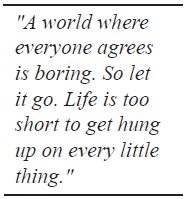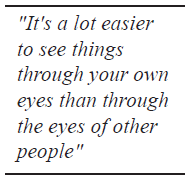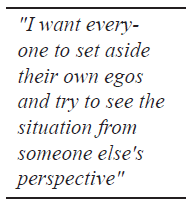Freedom of Speech and Respect for Others
We, as a community, struggle with the intersection of Freedom of Speech and Respect for Others every day. I do not, in any way, believe I am in a position to tell anyone what they should or should not say, do, or believe. Instead, I want to raise a few questions, start a discussion, and show you some of the responses I received when I asked some Olin students for their opinions. This is a personal piece, though, so in the end, you’re getting my two cents. Take it or leave it as you see fit.
Everyone at Olin comes here with their own set of experiences and values, which lead to some sort of framework for how we expect ourselves and others to interact with the world.
On one hand, that is a great thing. A world where everyone agrees is boring. So let it go. Life is too short to get hung up on every little thing. It’s fun to not take yourself seriously all the time.
If a person is upset, that is their problem to some extent. After all, we each need to take responsibility for our own feelings, and just because you are unhappy does not mean that your unhappiness is someone else’s fault. Just because you don’t like what someone else is doing, doesn’t mean you can or should stop them. Sometimes the best solution is to grow a thicker skin.
 On the other hand, sometimes people are completely disrespectful and out of line. Everyone loves a good joke, but some jokes really impinge on other people’s rights. Suddenly the joke seems a lot more like taunting instead of teasing. It sucks to feel that someone has completely disregarded you, is setting back the goals that you strive for, and just generally has no respect for you. What do you do when you’ve really been wronged and you don’t have a way to fix it?
On the other hand, sometimes people are completely disrespectful and out of line. Everyone loves a good joke, but some jokes really impinge on other people’s rights. Suddenly the joke seems a lot more like taunting instead of teasing. It sucks to feel that someone has completely disregarded you, is setting back the goals that you strive for, and just generally has no respect for you. What do you do when you’ve really been wronged and you don’t have a way to fix it?
We’re human, we all make mistakes. We are sometimes inconsiderate and unfair, because it’s a lot easier to see things through your own eyes than through the eyes of other people, especially those people who have very different opinions. And we all say, “If you have a problem with me, come talk to me,” but we all know how frustrating it is to bring a concern before someone and realize that they cannot or will not take you seriously.
 Now I’ve introduced two opposing points of view concerning whose responsibility it is to resolve the conflict that arises from our different values.
Now I’ve introduced two opposing points of view concerning whose responsibility it is to resolve the conflict that arises from our different values.
I posed a few questions on this matter to a few other students. Here are my questions and some of the responses. What do you think?
(Note: each of these responses is paraphrased and does not necessarily represent any particular person’s original ideas.)
Assuming we all have our own values and moral frameworks, how do you know what is ok to say/do and what is ‘over the line’?
- Empathy is essential. If you are just doing whatever and you don’t pay attention to the people around you, there is no way you will know if something is over the line.
- We’re not going to agree on a set of unambiguous rules, so think before you speak. If you believe in whatever it is, then say or do it. If people disagree, then at least you can have dialogue.
- Nearly everyone makes insensitive jokes at some point, but there’s a profound difference between one inappropriate joke and regularly pushing the boundaries of what’s OK.
- I check it against some subconscious framework, which takes into account intrinsic and extrinsic motivators and results in some gut feeling about what’s okay and what isn’t.
What should you do when someone has really offended you or is impinging on your rights?
- Try to engage them in a discussion. Work to see the situation from their point of view, and to help them see it from yours. Only then, give them concrete suggestions for ways to do things better.
- If I’m offended, someone will hear it. They might laugh it off, in which case I might just avoid that person, but stewing in your own anger is no way to solve a problem. The best thing for the community is always communication, even if it’s personally uncomfortable.
- Try to understand why they did it. Was it out of malice? Spite? An accident? If dialogue is unproductive and not worth it, try to be a good example, and speak through your examples. Spare yourself the frustration.
- I used to get angry and confront people if they offended me, but nowadays I try to swallow it and move on. Confronting someone from a source of anger is a lot less productive than understanding why they offended me and urging them not to do it again. When it comes to impinging on my rights, this usually comes in the form of OSL, which means I just wait it out.
How should we deal with other people finding our words and actions to be offensive? What if it seems clear that they are making a big deal out of nothing?
- I don’t care if you are offended. I care if you are being harmed. If my words are harming other people, that’s not OK and I should fix it. It’s worth spending the time to try to understand why someone is making a big deal out of your actions. If it really seems they are being irrational and petty, point it out respectfully and try to move past it.
- Freedom of speech isn’t being able to say whatever you want without any consequences. You can say whatever you want, but there will be consequences. What you say does have an impact and you are responsible for that impact.
- Beyond the words that are designed to be hateful; I can’t keep up with how every group of people wants to be addressed, and what’s more, I don’t much care. It’s bullshit to always have to worry about who I’m going to offend with any sentence I utter. Give people the benefit of the doubt. So long as it doesn’t cross the line into inciting violence/hate speech, everyone has a right to express their opinion using whatever words they like.
- People really do need to just chill out.
- Olin makes me uncomfortable… because everyone here is always uncomfortable.
- Try to have a conversation first. Talk to the R2s, as they can help resolve issues. If you think the person is just looking for a fight, try to aim their enthusiasm toward another issue. Telling someone they’re wrong when they’re already emotional doesn’t work well.
How do you think Olin as a community should resolve differences in value systems?
- Discussion and dialogue. If it becomes a larger issue than that, then the Honor Board should be involved.
- Prioritize individual rights. It is the right of individuals to express their opinions, as well as to personally judge others for their opinions. For the community to punish someone for stating their opinions is as offensive as it is ludicrous. The exception here is personal attacks, which are harmful and not OK.
- We as a community advocate for a community that is better for everyone, not just ourselves and the people we care about. A good community is not just a utopia for you.
What do I want? I want a culture where someone can make an off-color joke every once in a while and people won’t freak out. Sometimes we take ourselves way too seriously, and there is really something to be said for swallowing your pride and letting things go. Like one respondent said, sometimes the little things are not worth getting upset about. That said, there are always consequences for anything you say or do, and the things we say affect the people around us. Your joke may be setting back the efforts of people that you’ve pledged to respect, and I want a culture where that matters to us.
 Finally, when a breach of respect has happened, I want a solution that is less time consuming and polarizing than an Honor Board case and less frustratingly useless than many attempts at dialogue end up being. I want everyone to set aside their own egos and try to see the situation from someone else’s perspective, which I know is really, really hard.
Finally, when a breach of respect has happened, I want a solution that is less time consuming and polarizing than an Honor Board case and less frustratingly useless than many attempts at dialogue end up being. I want everyone to set aside their own egos and try to see the situation from someone else’s perspective, which I know is really, really hard.
But this isn’t only about what I want, is it? That’s the point. We’ve pledged to make this community a better place for everyone, not just a better place for ourselves and our friends.
***
Maybe you found this really valuable, and perhaps I’ve even instigated you to think about things in a new way, start discussions, and work towards a better community. Or maybe you read this and you thought, “Who the hell cares. Nice ideas Diana.” And that’s fine as well. I wrote this for you, too.
What do you think?
Submit a letter to the editors: submit@franklyspeakingnews.com